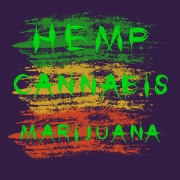Can the Hemp Industry Transact with the Marijuana Industry?
Two Distinct Legal Frameworks for Two Products that are not so Different
By: Dustin Robinson and Sean Hardwick
 Hemp and marijuana are botanically similar. Specifically, hemp is defined as cannabis with a concentration of 0.3% THC or less on a dry weight basis. However, cannabis is classified as marijuana both federally and in the state of Florida once the cannabis contains more than 0.3% THC on a dry weight basis. For operations, hemp and marijuana require a similar supply chain and infrastructure. While most states separate the hemp and marijuana industries into two distinct legal frameworks, the two industries could potentially complement one another through cooperation between hemp and marijuana operators. Yet, most state marijuana laws do not even contemplate the possibility of the two industries transacting with one another. This is a big mistake and states need to update their laws. Allowing hemp and marijuana operators to transact will improve supply issues in the marijuana industry; provide more sales channels for the hemp industry; improve patient access; and reduce costs in both industries.
Hemp and marijuana are botanically similar. Specifically, hemp is defined as cannabis with a concentration of 0.3% THC or less on a dry weight basis. However, cannabis is classified as marijuana both federally and in the state of Florida once the cannabis contains more than 0.3% THC on a dry weight basis. For operations, hemp and marijuana require a similar supply chain and infrastructure. While most states separate the hemp and marijuana industries into two distinct legal frameworks, the two industries could potentially complement one another through cooperation between hemp and marijuana operators. Yet, most state marijuana laws do not even contemplate the possibility of the two industries transacting with one another. This is a big mistake and states need to update their laws. Allowing hemp and marijuana operators to transact will improve supply issues in the marijuana industry; provide more sales channels for the hemp industry; improve patient access; and reduce costs in both industries.
There are numerous ways the hemp industry could one day transact with the marijuana industry. For example, the hemp industry could sell CBD isolate to marijuana companies to be converted into THC distillate. There are several companies who have filed patents on technology that can do this in a safe and efficient manner. Another way in which the hemp industry could one day transact with the marijuana industry is by providing marijuana companies with various isolated cannabinoids derived by hemp, including, but not limited to, delta-8 THC, CBD, CBN, and CBG. It is much cheaper to produce these minor cannabinoids by using hemp than marijuana. And there is an increasing demand for these minor cannabinoids as additional research studies are published demonstrating their potential benefits.
However, the laws in most states prohibit these types of transactions. For example, in Florida a marijuana licensee must grow, process, dispense, and deliver the marijuana it sells; and it cannot contract out for these activities and it cannot purchase product from another grower to be processed. Thus, a Florida marijuana licensee cannot purchase CBD isolate or any minor cannabinoids from a hemp company. If a Florida marijuana licensee was able to purchase the CBD isolate or minor cannabinoids, it would improve patient access; drive down costs; and allow the marijuana licensees to develop more innovative products. It would be a win for the hemp industry, marijuana industry, patients, and customers.
Additionally, hemp companies and marijuana companies can create strategic partnerships. The sale of hemp-derived products occurs online and in retail stores. Therefore, a hemp producer needs to generate traction with its customers on the hemp producer’s website, a hemp distributor’s website, or through retail store. Yet, stand-alone hemp product stores are often unsuccessful. Furthermore, the sale of hemp products in other retail stores such as grocery stores, pharmacies, or convenience stores is generally not a primary focus for the retail store. By contrast, marijuana may only be lawfully sold within a state-licensed dispensary facility. Further, marijuana dispensaries are seen as a reliable place to purchase cannabis products because each marijuana product must undergo rigorous testing and can be tracked after it is sold. Specifically, each marijuana product is tested for potency; microbial contaminants; metals contaminants; and residual solvent contaminants (if any solvents were used during manufacturing). In addition, all marijuana products are tracked using the state’s track-and-trace system. Therefore, hemp products sold in a marijuana dispensary will be viewed as more reliable. As a result, hemp producers and marijuana dispensaries will both benefit. Specifically, hemp producers can generate higher revenue from sales to dispensaries and reach more customers from the exposure the hemp product receives from being sold within marijuana dispensaries. Furthermore, marijuana dispensaries can offer customers a wider variety of products. Therefore, commerce between hemp and marijuana operators benefits both hemp and marijuana operators.
In short, the interaction between hemp and marijuana can create a variety of benefits for both industries. While Colorado has provided guidance for the hemp industry to transact with the marijuana industry, most states have not established frameworks that allow for hemp operators and marijuana operators to transact with one another. Because marijuana remains a Schedule I controlled substance under the Controlled Substances Act, any transaction between the hemp operator and marijuana operator may be federally illegal. Furthermore, without established regulations or clarification from a state’s marijuana or hemp program, transactions between hemp and marijuana operators may violate state law as well. As more states recognize the interaction between the hemp and marijuana industries, the lines between the two industries will be further blurred which will further buttress the need for federal legalization.


